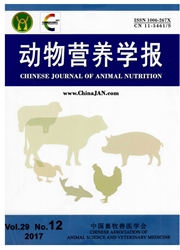

 中文摘要:
中文摘要:
哺乳动物体内自由基产生增多或机体清除自由基能力下降会造成自由基在体内大量蓄积。过量的自由基破坏肠道组织中DNA、脂质、蛋白质等生物大分子,造成肠道氧化应激损伤,影响营养物质的吸收、利用和动物的生长发育。因此,通过营养调控措施减少氧化应激引起的肠道损伤,对于维持动物肠道及整体健康具有重要的意义。乳酸菌作为机体先天性免疫系统的重要组成部分,能维护肠黏膜屏障功能及肠道内微生态平衡,并增强机体免疫力,促进动物的生长,保持肠道及整体健康。本文从小肠黏膜屏障功能的角度,综述了乳酸菌对肠道氧化应激的缓解作用及其通过抗氧化功能发挥益生作用的可能机制,为乳酸菌抗氧化作用的深入认识和科学应用提供参考。
 英文摘要:
英文摘要:
Free radicals production increase or scavenging capacity decrease can cause free radical accumulation in mammal body. Excess amount of free radicals can damage DNA, lipids, proteins and other biological macromolecules in intestinal tissue, resulting in intestinal oxidative stress, affecting the absorption and utilization of nutrients, and even animal growth and development. Therefore, to reduce the intestinal damage caused by oxidative stress through nutrition regulation to maintenance of the animal gut and overall health has important significance. Lactobacillus, the important part of body' s innate immune system, can maintain intestinal mucosal barrier function and intestinal micro ecological balance, it can also enhance immunity, promote animal growth, and maintain intestinal and overall health. From the perspective of intestinal barrier function, we reviewed the possible mechanism of Lactobacillus relieve intestinal oxidative stress and antioxidant function, in order to providing a depth understanding for Lactobacillus antioxidant function and scientific applications.
 同期刊论文项目
同期刊论文项目
 同项目期刊论文
同项目期刊论文
 Analysis of amino acid composition in proteins of animal tissues and foods as pre-column o-phthaldia
Analysis of amino acid composition in proteins of animal tissues and foods as pre-column o-phthaldia Supplementation with branched-chain amino acids to a low-protein diet regulates intestinal expressio
Supplementation with branched-chain amino acids to a low-protein diet regulates intestinal expressio 期刊信息
期刊信息
